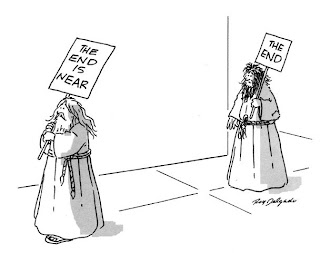Waxing Philosophical on Educational Reform
End is Near cartoon found at: http://biblicaljoy.wordpress.com/2010/06/22/week-11-signs-of-the-end/
While I do not have any specific historical data to back up this claim, I have to imagine that for as long as formal education has existed, there has likely been those who would be considered "educational reformers." Think about it. I'm sure there are any number of people whom history has long forgotten that observed how students were being taught and said, "There has to be a better way." Just as I am sure there have been reformers, the degree to which these reformers fell on a "radical change continuum" must also be extremely diverse.
I do not necessarily consider myself a reformer, but I do reflect upon the nature of education, how it is part of our human experience, and the effect of leadership on these experiences. I guess I am more of an educational philosopher than a reformer. In this light, I offer a few reflections, theories, etc. on the nature of educational reform. Note that these are simply ideas - I have no real evidence to back up these claims other than my own observations and experiences. Basically, this is more philosophical than practical.
The nature of reform is grounded in adjusting current practice to account for missing or ineffective elements in the educational process. I think terms like "reform" and "adjustments" are simply nicer ways of saying, "We need to make a change." Therefore, educational reformers, historically, have been the prophets and agents of change. The degree to which these reform effort shave been successful have likely depended on the degree to which the reformer understood the nature of change and how to lead others through these changes.
Of course, the opposite is also true. Not understanding the potentially devastating effects of change on others can quickly derail any effective change effort. If you combine a lack of sensitivity to how people respond to change with a weak leadership position (often due to lack of trust), then you have the perfect storm for a completely superficial reform effort that probably did more to spread fear and confusion than confidence and pride.
This would explain the relative failure of the many reform efforts put into place by politicians and government officials. The reforms were virtually impossible to achieve and the support promised to do so was largely insufficient. Thus, trust in the leaders of these reform efforts eroded (and will continue to do so until specific efforts are made to gain back that lost trust).
Another problem with sweeping changes or radical departures from the norm is the lack of continuity that these ideas bring with them. In order to lead a successful change initiative, there must be a link between how things are done now to how they will be done after the change. Also, continuity demands a real connection between how the effective pieces of the previous method will remain intact and part of the newer method. This, too, has been largely missing in recent years - there is little being doe to identify what is actually worth preserving and how to do so with the new ideas.
Ultimately, what separates the true reform leader to the guy wearing the "The End is Near" sign is how well he/she understands the nature of change and the necessity to preserve continuity.
I would strongly recommend the following books that concern leadership and change. While Dr. Evans' book is not specifically about change, it speaks very well of the challenges educational leaders face when attempting to implement changes.
